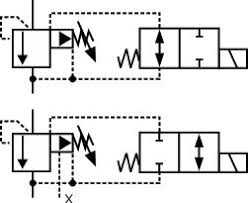Pressure Relief Valve Symbol

The Application of Pressure Relief Valve
When it comes to pressure management, the Pressure Relief Valve plays a crucial role. Also known as the Pressure Relief Valve Symbol, this device ensures system safety by releasing excess pressure. In various applications like using a ball valve for pressure washer systems or as a pneumatic pressure relief valve in pneumatic systems, these valves are indispensable. Among the reputable brands in this field is Rotork Pressure Relief Valve, known for its reliable and efficient products. Whether it’s maintaining safe pressure levels in industrial settings or protecting equipment from overpressure situations, the Pressure Relief Valve is a vital component in ensuring system integrity and operational safety.
Pressure Relief Valves
3-way valve symbol
3 way valve symbol
pneumatic pressure relief valve symbol
pressure relief valve symbol
pressure relief valves symbol
pressure limiting valve symbol
What Is Pressure Relief Valve ?
A Pressure Relief Valve is a safety device designed to automatically release excess pressure from a system to prevent damage or hazardous situations caused by overpressure.
How Does Pressure Relief Valve work?
A Pressure Relief Valve operates by opening to release excess pressure when system pressure exceeds a predetermined set point. This action helps prevent overpressure situations by diverting the excess fluid or gas to a safe location, ensuring the system remains within safe operating limits.
Features of Pressure Relief Valve
- Versatile: Pressure Relief Valves are versatile and can be used in various industries and applications to protect systems from overpressure.
- Adjustable Set Pressure: These valves allow for the adjustment of the set pressure threshold, providing flexibility in pressure management.
- Reliable Operation: Pressure Relief Valves offer reliable performance in critical pressure relief scenarios, ensuring system safety.
- Durable Construction: Built with high-quality materials like stainless steel or brass, these valves are durable and long-lasting.
- Easy Maintenance: They are designed for easy maintenance and inspection, facilitating efficient upkeep of pressure management systems.
Advantages of Pressure Relief Valve
- Safety: Pressure Relief Valves ensure system safety by preventing overpressure incidents.
- Equipment Protection: They protect valuable equipment from damage due to excessive pressure.
- Reliability: These valves offer reliable operation in critical pressure relief scenarios.
- Versatility: Pressure Relief Valves are suitable for various industries and applications where pressure management is essential.
- Compliance: They help industries comply with safety standards and regulations regarding pressure relief systems.

The Specifications of Pressure Relief Valve
| Specification | Details |
|---|---|
| Type | Pressure Relief Valve |
| Ball Material | Stainless Steel, Brass, or PTFE |
| Attachment Type | Threaded, Flanged, or Welded |
| Thread Standard | N/A |
| Thread Size | Varies |
| Body Material | Aluminum, Cast Iron, or Stainless Steel |
| Safe for Use With | Various systems and applications |
| Handle Type | N/A |
| Handle Material | N/A |
| Max. Working Pressure | Varies |
| Max. Working Pressure | Varies |
| Operating Pressure | Varies |
The Parameter of Pressure Relief Valve
- Type: Pressure Relief Valve
- Ball Material: Stainless Steel, Brass, or PTFE
- Attachment Type: Threaded, Flanged, or Welded
- Thread Size: Varies
- Body Material: Aluminum, Cast Iron, or Stainless Steel
- Safe for Use With: Various systems and applications
- Handle Type: N/A
- Handle Material: N/A
- Maximum Working Pressure: Varies (psi and bar)
- Operating Pressure: Varies
The Operation Theory of Pressure Relief Valve
The operation theory of pressure relief valves, such as the Caleffi pressure reducing valve, and those used in drip irrigation involves maintaining optimal pressure levels within a system. These valves automatically adjust to release excess pressure, ensuring equipment and pipelines remain safe from damage caused by high pressures. In drip irrigation systems, pressure reducing valves regulate water flow to the precise level required for efficient watering, preventing water waste and ensuring uniform distribution to plants. This essential component helps optimize performance and longevity in various plumbing and irrigation applications.
The Parameters Table of Pressure Relief Valve
| Parameter | Description |
|---|---|
| Valve Type | Pressure Relief Valve |
| Maximum Pressure | The maximum pressure the valve can handle |
| Set Pressure Range | The range of pressures at which the valve operates |
| Connection Type | The type of connection (e.g., threaded, flanged) |
| Body Material | The material of the valve body (e.g., brass, stainless steel) |
| Seat Material | The material of the valve seat (e.g., EPDM, brass) |
| Disc Material | The material of the valve disc (e.g., stainless steel, bronze) |
| Spring Material | The material of the valve spring (e.g., stainless steel, Inconel) |
| Seal Material | The material of the valve seal (e.g., Nitrile, Viton) |
| Operating Temperature | The temperature range within which the valve operates effectively |

